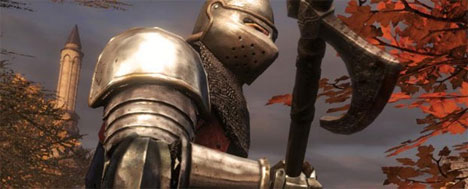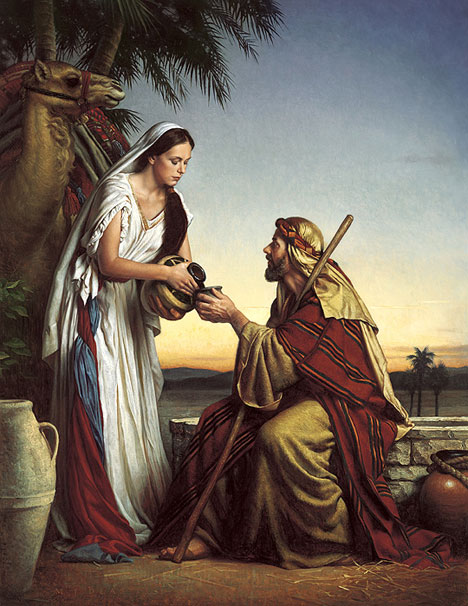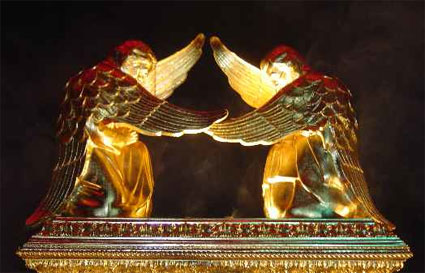Sep
8
2013

“Whoever sheds the blood of man,
by man shall his blood be shed,
for God made man in his own image.”
(Genesis 9:6)
James Jordan’s contribution to the study of any particular book of the Bible is invaluable, but the most important is very likely his work on Genesis. Because spineless modern theologians are unwilling to stand for its complete veracity, and yet very willing to jettison basic logic, they often miss the significance of its early chapters for the rest of the Bible and of history.
Continue reading
Comments Off | tags: cherubim, Genesis, James Jordan, Noah, Psalms, Seraphim | posted in Bible Matrix, Biblical Theology, Ethics, The Last Days
Oct
6
2010
The Fruitful Field

“For I am jealous for you with godly jealousy. For I have betrothed you to one husband, that I may present you as a chaste virgin to Christ.” 2 Cor 11:2
Women are Complex
In Eden, as priest to Eve, Adam’s role was to continually bring her to the Father. She was put “below” Adam in the hierarchy. As the first approach of the High Priest on the Day of Covering — with the blood of a bull — Adam would present himself, standing before God as Mediator (head):
F A T H E R > < S O N + B R I D E
Adam’s job was to bring Eve “between” as the fruit, the evidence, of Covenant relationship. By being faithful to the law, he would open and maintain a clean, safe, Holy Place — a firmament — a house for the bride. The second approach of the High Priest was to cover the body, the nation. In this, he presented the blood of the first goat as the faithful bride (goat hair, symbolising the Lord’s cloud of “bridal” glory, covered the Tabernacle). Like the glory between the Father and the Son in heaven, a glorious Eve was both the fruit of Adam’s obedience, and her future fruitfulness a gift from Father to Son:
F A T H E R > B R I D E < S O N
We see this imaged in the search for and presentation of godly Covenant brides in Genesis. Eliezar and Jacob seek brides for presentation to the Covenant fathers.
Continue reading
Comments Off | tags: Ark of the Covenant, Atonement, Baptism, cherubim, Circumcision, Covenant Theology, Genesis, Joshua, Marriage, Revelation, Satan, Systematic typology, Tabernacle | posted in Bible Matrix, Biblical Theology, Creation
Sep
4
2009

The Insiders
“For the eyes of the LORD move to and fro throughout the earth that He may strongly support those whose heart is completely His.” 1 Chron. 16:9
The Bible was written to be understood by word-search software, or by believers who think that way. There are many expressions and phrases that are used repeatedly—very deliberately—so that the reader makes connections.
Continue reading
Comments Off | tags: Abraham, Ascension, Canaanites, cherubim, Covenant curse, Esther, Ezekiel, Joshua, Moses, Satan, Typology | posted in Biblical Theology, Christian Life
Jul
16
2009

“And she saw two angels in white sitting,
one at the head and the other at the feet,
where the body of Jesus had lain.”
- John 20:12
Two Witnesses
The father of the English backpacker who was lost in the Blue Mountains wrote in the visitors book at the hotel where he stayed. He wrote that he was going briefly back into the bush to carve a memorial to his son into one of the rockfaces. Thankfully, as he waited for his flight home to the UK, his son walked out of the wilderness yesterday suffering from hunger and exposure, but alive. As I have discussed in this series [1], the Bible is full of memorials to important events.
Getting God’s people out of the wilderness is a legal procedure. A minimum of two witnesses is required. First, there are two preachers who spy out the enemy and warn them of impending judgment. The feast pattern consistently puts this at “Trumpets”, which helps us identify some of its more subtle appearances:
Continue reading
Comments Off | tags: cherubim, David, Lot, Moses, Stigmata, Two witnesses | posted in Biblical Theology, The Last Days
Jun
15
2009

One major difference between Jordan and other preterists is his identification of Paul’s “man of sin.” Jordan is correct in naming the Herods rather than Nero because he understands biblical typology better.
Continue reading
2 comments | tags: Belshazzar, cherubim, Daniel, Esther, Film, Herod, James, James Jordan, Joseph, Mordecai, Nero | posted in Biblical Theology, The Last Days, The Restoration Era






























